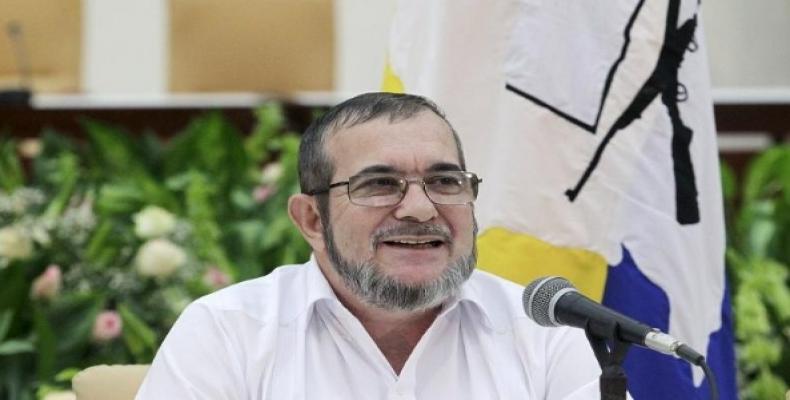Bogotá, November 18 (teleSUR-RHC)-- The head of the Revolutionary Armed Forces of Colombia, Timoleon Jimenez, called on the government of Juan Manuel Santos to stop stalling on peace negotiations and reiterated the guerrilla army's commitment to reach a final deal to end over five decades of armed conflict in the South American country.
“Today we are worried that on the government side there seems to be a deliberate effort to slow down (negotiations), to complicate the progress of the agreements,” read a statement by the guerrilla leader posted Tuesday.
Negotiations have been ongoing since late 2012 and expectations were raised that a final deal was at hand when Jimenez, also known as Timochenko, met with Colombian President Juan Manuel Santos in Cuba for a special ceremony to commemorate an agreement regarding transitional justice.
During that event, President Santos said he and Timochenko had also agreed to have a final deal in place by late March 2016.
However, not long after the ceremony in Havana, the government made public comments suggesting that the document regarding transitional justice was only a draft, to the displeasure of the negotiating team of the Revolutionary Armed Forces of Colombia, known as the FARC. As far as they were concerned the text was final.
The matter is still not closed, a fact that Timochenko touched on in his statement, who placed the blame at the feet of the government.
President Santos responded to the letter Tuesday from the Philippines at the APEC summit.
“It is not the Colombian government's fault that negotiations are delayed. For our part, there is a commitment and great interest in reaching an agreement as soon as possible,” said Santos.
The Colombian president also suggested that the March 23, 2016 deadline was not negotiable. FARC leader Timochenko questioned the logic of imposing a fixed deadline.
“And what if come March 23rd there is no final agreement? Would we throw out our work and what we have achieved over this long period? It would not be appropriate nor fair,” said Timochenko.
He further speculated that perhaps the emphasis on the deadline and the alleged stalling tactics were an effort to get the guerrilla group to accept concessions.
In an interview with teleSUR shortly after the ceremony in Cuba, Timochenko said that they had precisely avoided establishing deadlines out of fears that it would be turned against them.
“I have never agreed with deadlines, they can be fatal, they're dangerous, especially for us (rebels) … The state has a media capacity, to sell a lie and make it a true,” said the FARC leader in September.
Timochenko stressed in his letter that the guerrilla army remains firmly committed to achieving peace and that the airing of these criticisms was born out of a desire to see a deal signed.
“By making the current obstacles known we expect the national government will have a positive attitude that will allow us to end this long conflict as soon as possible. President Santos, with will, all agreements are possible. Ours exists and is firm, let us do it,” said Timochenko.
As an indication of its will to end the conflict, since the signing ceremony the FARC has suspended the acquisition of weapons, ceased combat training in order to focus on political and cultural education and halted recruitment of new combatants.


